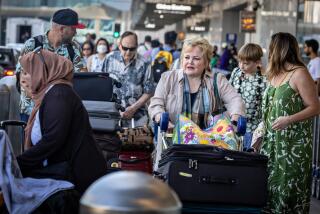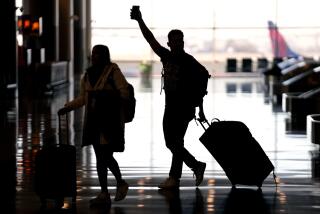U.S. and Foreign Airlines Tighten Their Security
- Share via
WASHINGTON — U.S. and foreign airlines, stunned by a succession of air tragedies during the last 10 days, announced Monday that they will immediately increase their own security procedures, as airports and governments moved to reduce the threat of terrorism.
“It is vital . . . that nations of the world must not let terrorists paralyze the free movement of passengers and goods,” said Richard F. Lally, director of security for the Air Transport Assn., which represents the nation’s commercial airlines.
He said that “for obvious security reasons” the airlines will not publicly discuss details of their new security measures but that they will include intensified screening procedures and new instructions to flight and ground personnel.
The action came in the aftermath of the June 14 hijacking of TWA Flight 847 to Beirut, where 40 passengers and crew remain hostage; a bombing in Frankfurt’s airport; an explosion in baggage being unloaded at Tokyo’s Narita International Airport, and the possible sabotage of an Air India jumbo jet that crashed off Ireland on Sunday, killing all 329 on board. A total of six people died in the other incidents.
Authorities in Canada and Europe have tightened airport security in the wake of the latest incidents. In West Germany, a government spokesman said, “We will employ every means at our disposal against terrorist attacks.”
Daniel Smith of the International Airline Passengers Assn. said: “We know (the new measures) will involve passenger delays and inconvenience, but frankly, we don’t care at this point. It’s better to be delayed than dead.”
While all luggage carried by hand onto American and Canadian aircraft must go through metal detectors or X-rays, security experts noted that items checked through to U.S. airline baggage holds are not necessarily screened for metal or explosives.
X-Ray Screening Delays
Screening every bag by X-ray would add 3 1/2 hours to the boarding of every aircraft, said Tom Ashwood, a TWA pilot and security chief for the Air Line Pilots Assn.
A more careful look also needs to be taken at airport areas beyond those where passengers are screened, said Harry Atterton, a spokesman for the International Air Transport Assn., which represents most of the world’s major commercial airlines.
“One of the most sensitive areas is the ramp, where the loading and unloading and servicing takes place,” Atterton noted. “At that time, you have a great number of different groups of people near the airplane.”
Henry Duffy, president of the Air Line Pilots Assn., agreed.
“We know there are known gaps in the security system on (that) side, with incomplete background checks on the people that are doing the servicing,” he said. “That’s the flaw in the security mechanism.”
Security Proposals
Secretary of Transportation Elizabeth Hanford Dole will send President Reagan a detailed report today proposing a range of actions to improve airport security, according to Transportation Department officials.
They said the report will include recommendations for:
--Stepped up federal research and development of security measures.
--Increased training of airline flight and ground personnel.
--Improved security near airplanes being serviced.
--Tightened procedures for screening checked baggage and carry-on luggage.
--More sky marshals to work on the ground as well as in the air.
The Air Transport Assn. also called on the world aviation community to “tighten airport safeguards and enforce international agreements with sanctions, if necessary, to prevent terrorists from harming world commerce.”
The organization said that it has asked American government officials to take “new initiatives” with foreign aviation authorities, such as “provisions for regular inspection of international airports, identification of deficiencies and strict and prompt followup to assure corrections where necessary,” as well as the development of an “enforcement mechanism” in international law to assure compliance.
‘Goulish Claims’
Secretary of State George P. Shultz sent letters Monday to the foreign ministers of India, Canada and Japan “expressing our shock and indignation” over the Air India crash and Tokyo explosion Sunday. The letters deplored the “ghoulish claims of responsibility” by Sikh separatists in the Air India incident.
“We condemn in the strongest possible terms the despicable acts by terrorists during the past days against innocent travelers,” the State Department said in a statement. “All nations must unite in decisive action to curb this threat.”
In Luxembourg, air transport ministers from the 10 nations in the European Economic Community met Monday to discuss security and pledged to fight “any criminal interference whatsoever in civil aviation.”
And the International Air Transport Assn. said it has scheduled a meeting of its security advisory committee Friday at its Montreal headquarters.
Duffy said officials of the International Assn. of Air Line Pilots met Monday in London to examine international airport security questions. He said he believes that the 65,000 pilots in 67 countries represented by the group “will satisfy themselves that either the airplane they are operating is screened safely, or they won’t operate the airplane.”
He said the traveling public need not fear airline travel. “I hope we will be able to convince passengers that we are taking the proper actions to eliminate threats to the airplanes,” he said. “Nobody is standing still on this--from the Administration to the pilots to the Congress.”
More to Read
Sign up for Essential California
The most important California stories and recommendations in your inbox every morning.
You may occasionally receive promotional content from the Los Angeles Times.













